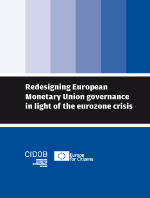Steinberg, Fr., Vermeiren Matt., (2015), “Germany’s Institutional Power and the EMU Regime after the Crisis: Towards a Germanized Euro Area?”, Journal of Common Market Studies, 2015, pp.1-20. In this article we examine the constraints on Germany’s influence over reforms of the Economic and Monetary Union’s (EMU) macroeconomic governance regime. Drawing on the insights of historical institutionalism, we show that the German government’s control over the process is constrained by the …Read More
Ten Takeaways from the ‘Rethinking Macro Policy. Progress or Confusion?
Blanchard, Ol. (2015), “Ten Takeaways from the ‘Rethinking Macro Policy. Progress or Confusion?”, Voxeu, 25 May. On 15-16 April 2015, the IMF organised the third conference on ‘Rethinking Macro Policy’. In this column, IMF’s Chief Economist Olivier Blanchard presents his personal takeaways from the conference. Though progress in macro policy is undeniable, confusion is unavoidable given the complex issues that remain to be settled. Σχετικές αναρτήσεις Mortensen, Jorgen, Alcidi …Read More
The Monetary Policy of the European Central Bank (2002-2015)
Miscossi, St., (2015), “The Monetary Policy of the European Central Bank (2002-2015)”, CEPS Special Report, 22 May 2015. This paper examines the policies pursued by the European Central Bank (ECB) since the inception of the euro. The ECB was originally set up to pursue price stability, with an eye also to economic growth and financial stability as subsidiary goals, once the primary goal was secured. The application of a single monetary …Read More
In It Together: Why Less Inequality Benefits All
In It Together: Why Less Inequality Benefits All, OECD, 21 May The gap between rich and poor keeps widening. Growth, if any, has disproportionally benefited higher income groups while lower income households have been left behind. This long-run increase in income inequality not only raises social and political concerns, but also economic ones. It tends to drag down GDP growth, due to the rising distance of the lower 40% from the rest …Read More
Critique of accommodating central bank policies and the ‘expropriation of the saver’: A review
Bindseil, Ulr., Clemens D., and Zeuner, J., (2015), “Critique of accommodating central bank policies and the ‘expropriation of the saver’: A review”, ECB Occasional Paper Series, N.161/May 2015. In parts of the German media, with the support of a number of German economists, the ECB’s low nominal interest rate policy is criticised as unnecessary, ineffective and as expropriating the German saver. This paper provides a review of the relevant arguments. It is …Read More
The ECB’s bond purchase programmes and the limits of national risk-sharing
Benink, Η., Huizinga, Η., (2015), “The ECB’s bond purchase programmes and the limits of national risk-sharing”, www.voxeu.org, 16 May. QE in the Eurozone is unusual in that the risks of sovereign debt defaults are shared between the ECB and the national central banks. This column argues that if such risk sharing were applied to the Outright Monetary Transactions programme, it could potentially create insolvency problems for countries with large public …Read More
Redesigning European Monetary Union governance in light of the eurozone crisis
Cidob, (2015), “Redesigning European Monetary Union governance in light of the eurozone crisis”, Coleccion Monografias-Barcelona Center for International Affairs, May 2015 When political leaders met at Maastricht in December 1992 and took the historic decision to create the EMU, they were responding to several challenges. First, the gradual liberalisation of capital movements that was necessary to complete Europe’s single market made it increasingly difficult to stabilise exchange rate fluctuations in the …Read More
The coming defaults of Greece
Wyplosz, Charles (2015) “The coming defaults of Greece”, 27 April. It seems that there will be no agreement between Greece and its Eurozone partners. Short of cash, the Greek government will have no choice but to suspend payment of its maturing debts. This column looks at what happens next. In brief, it will be very much up to the ECB to decide. Relevant posts Stratos D. Kamenis: Vulture Funds and …Read More
Financial integration in Europe: 2015
European Central Bank, (2015), Financial integration in Europe: 2015, April. Financial integration in the euro area has improved steadily and has reached a level close to that before the sovereign debt crisis Establishment of Banking Union and unconventional monetary policy actions taken by the ECB are major drivers of the improvement Financial integration is crucial for restoring efficient credit flows to the real economy Overall, financial integration in Europe has …Read More
Euro-area governance: what to reform and how to do it
Wolff Guntram , Sapir André, (2015), “Euro-area governance: what to reform and how to do it”, Bruegel Policy Brief , 27 April. The Issue Reform of the governance of the euro area is being held back by disagreement on what is at the root of the euro area’s woes. Pre-crisis, the euro area suffered from the built-up of financial imbalances, price and wage divergence and an insufficient focus on debt …Read More





